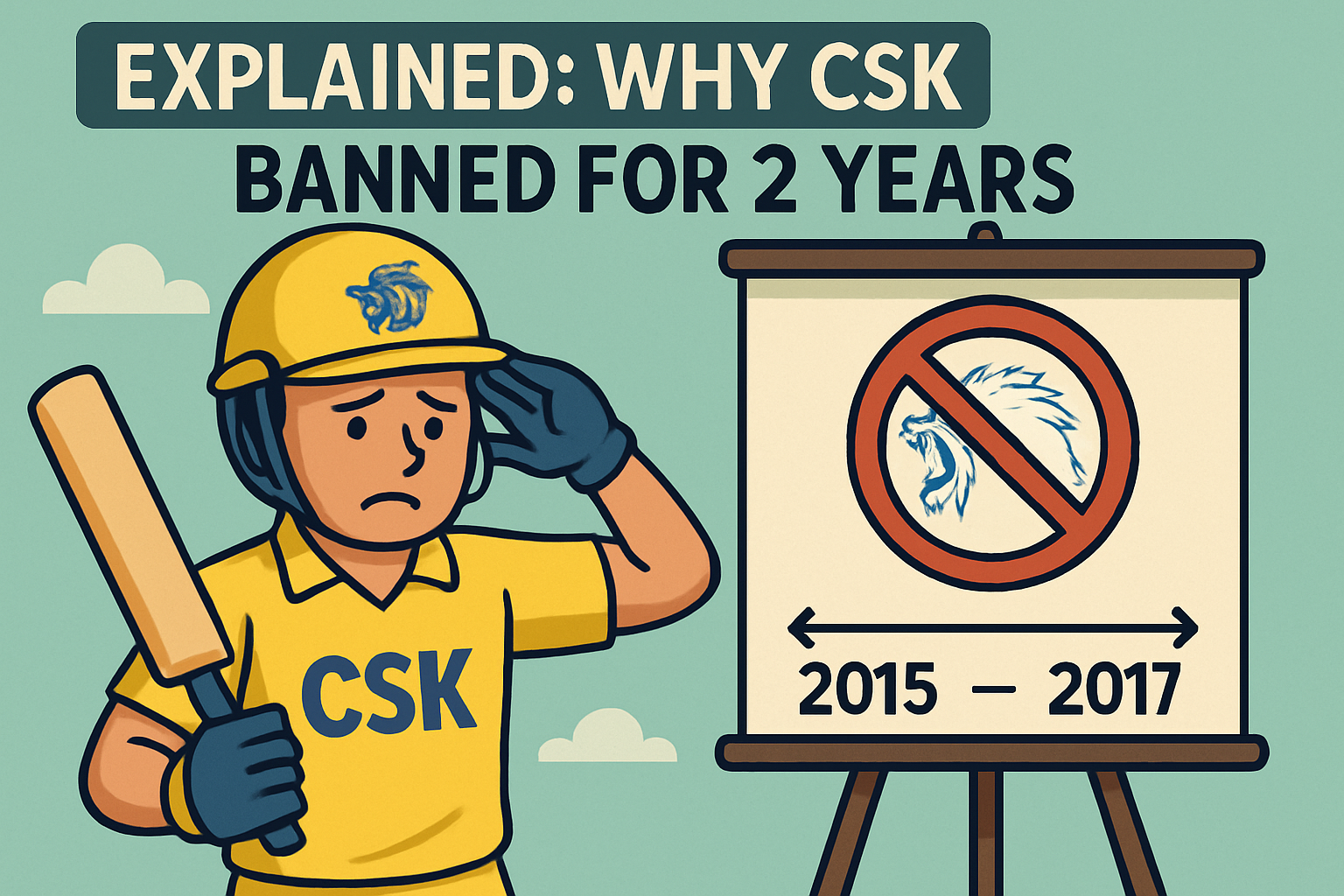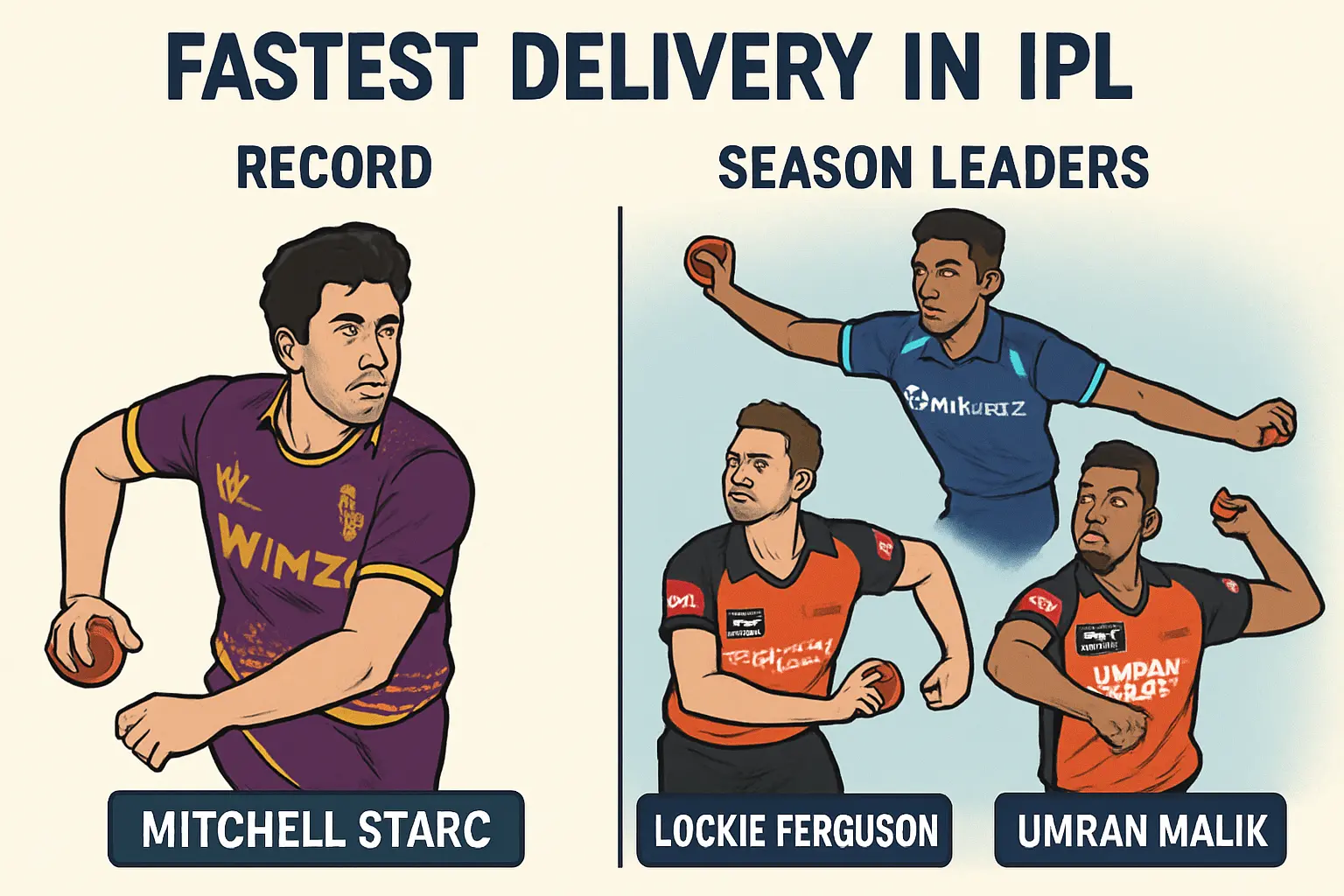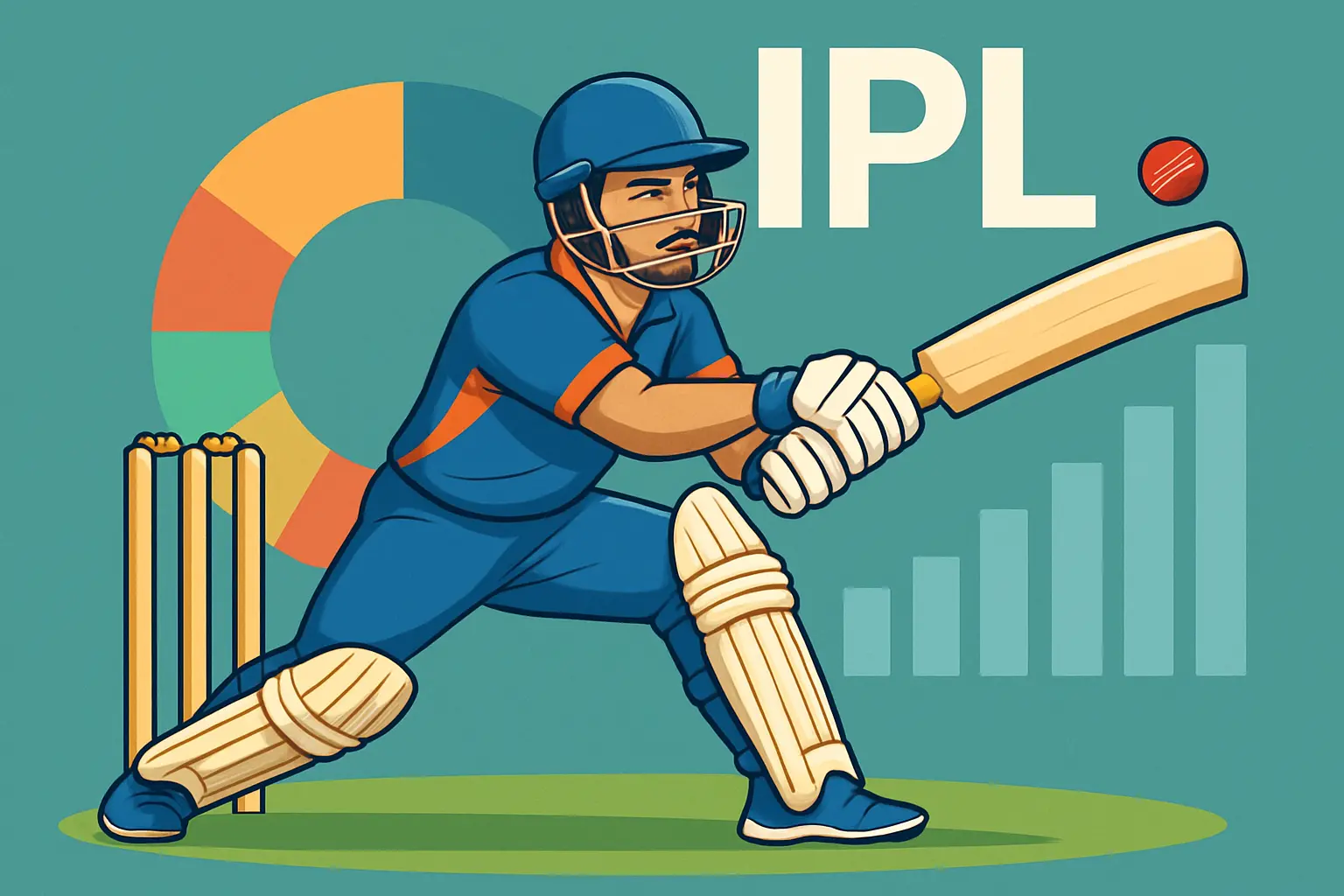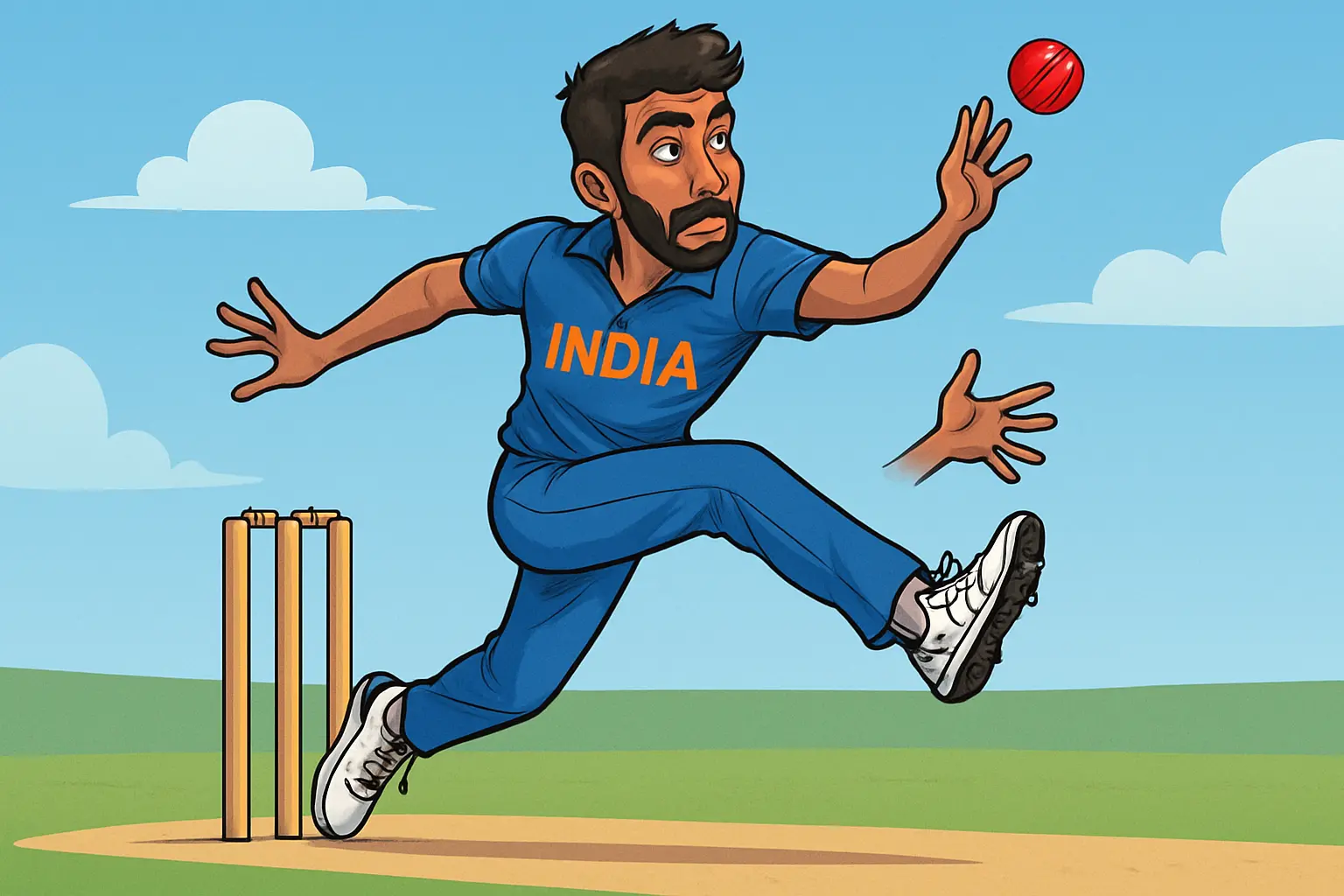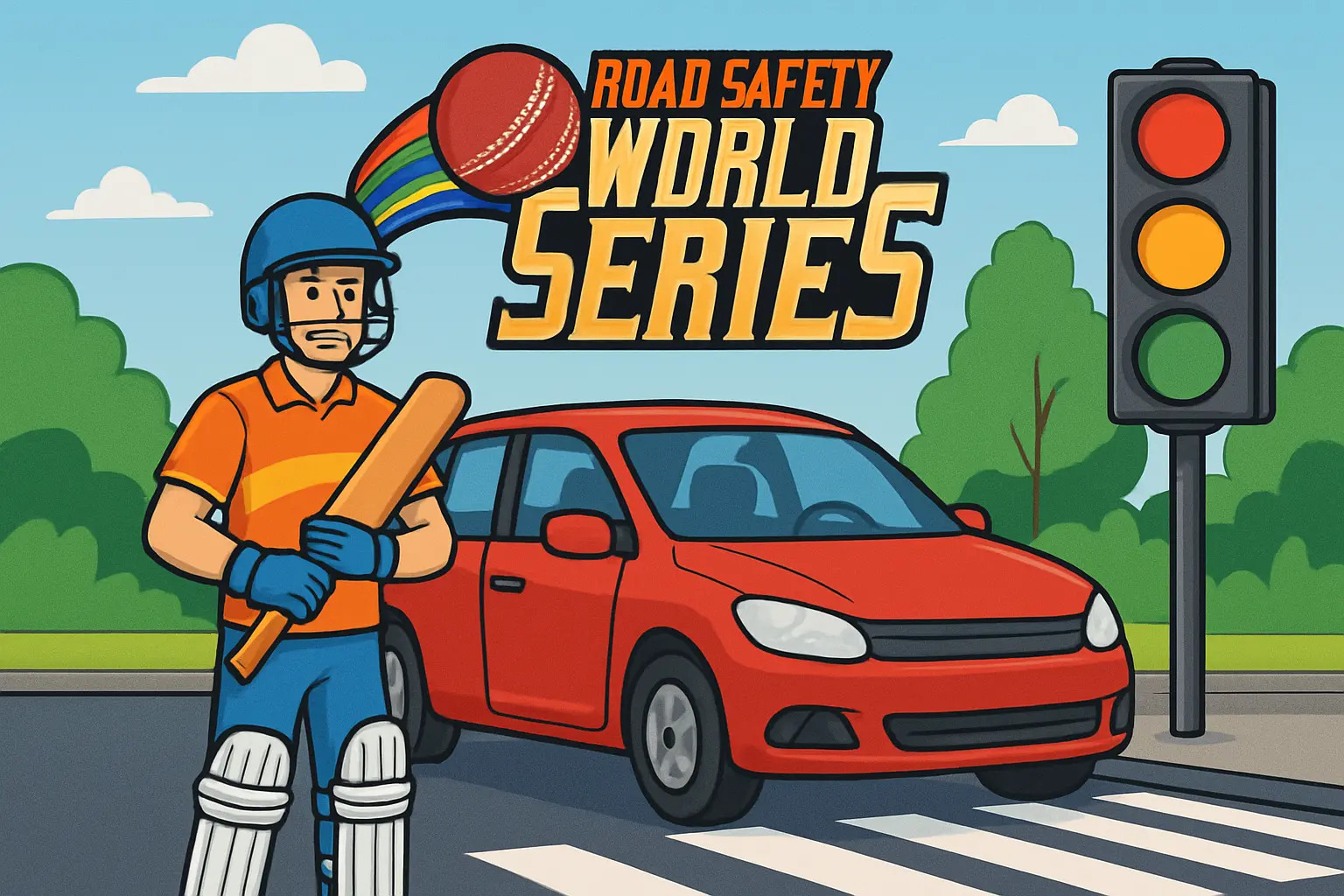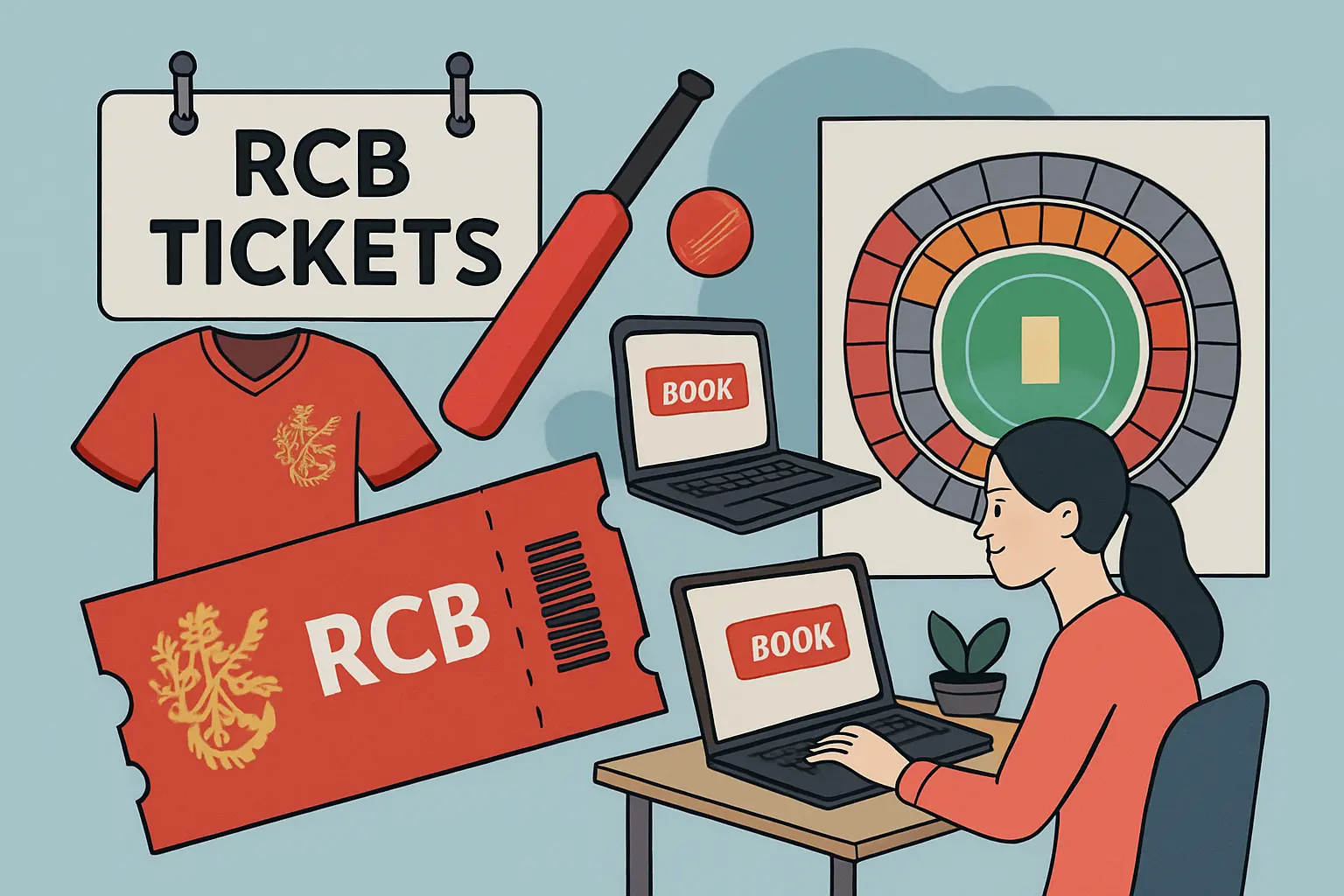Chennai Super Kings were suspended for two IPL seasons after the Justice R. M. Lodha Committee found that a CSK team official, Gurunath Meiyappan, was involved in betting during a previous edition of the league. The committee ruled that such conduct brought the game into disrepute and imposed a two-season franchise suspension. CSK returned the very next cycle after serving the full term.
The short answer: the reason for CSK’s ban
- The reason for CSK’s two-year suspension was betting by a team official, Gurunath Meiyappan, during a past season. The Supreme Court-appointed Justice Lodha Committee held that a franchise is responsible for the actions of its officials; betting by a senior official violated the IPL’s operational rules and the BCCI’s anti-corruption framework. The panel concluded that the conduct damaged the league’s integrity, and it suspended CSK for two seasons. This was not a punishment for CSK players or for proven spot-fixing by the team; it was a disciplinary action tied to an official’s betting and the resulting reputational harm.
CSK ban explained: the full story, told by a niche insider
If you followed the league from the beginning, you’ll remember how quickly it grew from a domestic T20 experiment into the epicenter of Indian cricket. With that success came glare, money, and a corresponding shadow: illegal betting syndicates and the temptation of quick information. The season when the scandal broke felt different in every press room and players’ lounge I visited. Unfamiliar faces sniffed around hotels. Bookies were texting intermediaries. Some whispers were theater. Others weren’t.
The scandal had two threads often mixed up in public memory: spot-fixing by certain players in one franchise, and betting by a senior official connected to another. The latter is where CSK’s story sits. While players from a different side were arrested for allegedly underperforming specific deliveries, the allegation against CSK’s team official was that he bet on matches, exchanged messages with bookmakers, and possessed inside knowledge that bettors crave. The line between gossip and proof is thin in sport, but one thing was clear: the Supreme Court took the matter out of the cricket board’s hands and asked independent judges to find facts and recommend punishments that fitted the damage done to the sport’s credibility.
The Lodha Committee’s brief was straightforward: investigate, separate myth from evidence, and restore trust. In its report, the panel described Meiyappan as a “team official” of CSK and found that he had been actively betting. It also emphasized that under IPL rules, franchises carry vicarious responsibility for their principals and officials. When an official gambles on matches, it isn’t a private vice; it is a breach that can tilt information markets, erode dressing-room trust, and compromise fair competition.
To safeguard the league, the committee handed CSK a suspension spanning two full IPL seasons. Rajasthan Royals, whose co-owner Raj Kundra was also found to have bet on matches, received the same quantum of punishment. The panel also recommended life bans from cricket-related activities for the two individuals involved in betting. The core rationale wasn’t theatrical or populist. It was regulatory: when those closest to a team manipulate betting markets, the stain splashes the entire ecosystem—players, staff, broadcast partners, and fans.
What actually happened: the scandal season, the fallout, and the verdict
- Setting: the sixth edition of the league was rolling along with its usual fireworks when the first fissures appeared. The scandal cracked open via police intercepts, late-night arrests, and a chain of phone calls that led to familiar names. In separate strands, three players from Rajasthan Royals were accused of spot-fixing. In the CSK strand, Mumbai investigators linked Gurunath Meiyappan to bookmakers and alleged betting activity.
- Who is Gurunath Meiyappan? He acted as the Team Principal at CSK, had unrestricted access to players and team strategy, and was seen in the dugout on match days. The Supreme Court later interpreted his role unequivocally: he was a team official.
- Betting vs spot-fixing: this distinction matters. Spot-fixing is the manipulation of micro-events—say, bowling a no-ball at a chosen moment—often in exchange for money. Betting, by contrast, is the placing of wagers on match outcomes or micro-markets. While the former involves active on-field manipulation by players, the latter can corrupt the market if the bettor has non-public insight from within a team environment. In CSK’s case, the committee did not establish that players fixed events; it established betting by an official, which is itself a grave offense under cricket’s codes because of the potential misuse of inside information.
- The judicial arc: after preliminary fact-finding and oversight by an earlier committee, the Supreme Court appointed the Justice Lodha Committee to adjudicate punishment. The Lodha panel reviewed evidence, heard stakeholders, and issued a binding verdict against the two franchises.
- The punishment: two seasons out of the IPL for CSK. The franchise sat out the next two cycles, and then returned the season after that.
The rules that were broken: why the law took a hard line
Cricket’s codes do not treat all infractions equally. Slow over-rates and equipment infringements are misdemeanors. Corruption is existential. The IPL’s Operational Rules and the BCCI Anti-Corruption Code make that clear. They bar players, team officials, and franchise associates from betting on matches. They codify that a franchise is responsible for its staff and officers. They also empower disciplinary bodies to impose suspensions if actions by owners or officials bring the game into disrepute.
To the lay fan, “betting” can sound like a side hobby with personal risk only. Within a professional dressing room, it is dynamite. An official who wagers doesn’t just risk money; they risk exchanging privileged knowledge—injury status, batting order changes, bowling match-ups planned for certain opponents—for a better line. Even a smirk in a hotel lobby can move odds. That’s why the Lodha Committee treated betting by an official as sufficient for franchise-level sanction. Intent to fix wasn’t a prerequisite; the act itself undermined trust.
Where N. Srinivasan fits in, and why it mattered
The CSK controversy was inevitably framed through the lens of N. Srinivasan, then the towering figure in Indian cricket and the head of India Cements, the parent company that owned CSK. Srinivasan’s proximity to both the boardroom and a franchise had long triggered uneasy questions about conflict of interest. By the time the scandal broke, those questions took center stage. The court scrutinized the structure, noted the family relationship between Srinivasan and Meiyappan, and underlined the principle that governance must be seen to be clean, not merely claimed to be clean.
Out of the Lodha process came not just punishment but larger governance reforms: stricter norms on conflict of interest; a firewall between administrators and commercial interests; and a clear signal that disciplinary committees would act without fear or favor. CSK’s suspension was the most visible part of that reset, but it wasn’t the only one.
A timestamped timeline you can trust
- Sixth edition: Police raids and arrests light up the news cycle. In one branch, three Rajasthan Royals players are picked up on allegations of spot-fixing. In another, Gurunath Meiyappan is linked by investigators to betting activity.
- Following months: Court oversight ensures independent inquiry. A judge-led probe sifts call records, testimonies, and operational roles.
- Committee verdict season: The Justice Lodha Committee declares Meiyappan a CSK team official, finds him guilty of betting, and rules that the franchise bears responsibility for the acts of its officials. It also records Raj Kundra’s betting in relation to Rajasthan Royals.
- The punishment window: CSK and Rajasthan Royals are each suspended for two full seasons. The league runs without both franchises during this period.
- The return: Immediately after serving the suspension, CSK re-enters the league and, in a storybook comeback, lifts the trophy in their first season back.
Was it spot-fixing or betting in the CSK case?
This is the most common source of confusion. The marquee headlines back then blurred together: spot-fixing arrests of players from one team, betting allegations against officials connected to another. The CSK-specific case that triggered the suspension was about betting by Gurunath Meiyappan, not about CSK players fixing events.
That distinction is important. Spot-fixing is an on-field manipulation—the deliberate act of a player to alter a specific event in a game. Betting is off-field but corrosive if the bettor has access to team secrets, injury updates, or tactical plans. Both are banned. One requires players’ complicity; the other can corrupt outcomes indirectly via information markets. In the committee’s view, allowing a franchise to continue after an official was found to be a bettor would normalize the presence of compromised insiders.
Which seasons was CSK banned?
CSK sat out two consecutive IPL campaigns immediately following the Lodha Committee verdict. They returned in the season that followed those two, and they won the title on comeback.
Who is Gurunath Meiyappan and what exactly did he do?
- Role: A senior CSK figure commonly referred to as Team Principal. He was a familiar face in the dugout and at team strategy sessions.
- Conduct: Investigators and the judge-led panel concluded he placed bets on IPL matches and was in communication with bookmakers. The panel determined he was a team official under the league’s rules, which meant the franchise’s obligations and liabilities applied.
- Consequence: Life ban from cricket-related activities recommended by the committee; his conduct was the catalyst for the two-season suspension handed to CSK.
Did any CSK players get banned?
No CSK player was banned in relation to the conduct that triggered the franchise suspension. The spot-fixing arrests from that period involved players from Rajasthan Royals. Those players faced bans under the BCCI’s anti-corruption framework, some of which were reviewed or modified over time by various judicial and administrative processes. CSK’s penalty was rooted in an official’s betting, not player misconduct.
CSK vs Rajasthan Royals: what was similar, what differed
Both franchises were suspended for two seasons based on the Lodha Committee’s findings tied to their respective officials’ betting. But the fabric of each case had different fibers.
Comparison: CSK vs RR two-season suspensions
Triggering individual:
- CSK: Gurunath Meiyappan, declared a team official, found to have bet on matches.
- RR: Raj Kundra, associated with franchise ownership, found to have bet on matches.
Nature of wrongdoing:
- CSK: Betting by an official; no proven spot-fixing by CSK players in that case.
- RR: Betting by an owner-level figure; separate to that, certain RR players were arrested for spot-fixing.
Basis for franchise liability:
- Both: IPL rules impose responsibility on franchises for the acts of their owners/officials; conduct bringing the game into disrepute invokes suspension provisions.
Sanction:
- Both: Two-season suspension from the league.
Symbolic impact:
- CSK: Elevated scrutiny of conflict-of-interest in governance, given ownership links to wider cricket administration.
- RR: Emphasis on stronger player education and ACU monitoring, given the spot-fixing arrests connected to players.
Legal and disciplinary context: the guardrails that saved the tournament
Ask anti-corruption officers what keeps them up at night and they’ll give you a simple answer: proximity. Bookies seek proximity to decision-makers—captains, coaches, owners, team principals—anyone who can access non-public information. That’s why the IPL’s rules lean heavily on two principles:
- Zero tolerance for betting and match manipulation by participants and insiders.
- Vicarious responsibility: a franchise must ensure its officials comply; failures by key individuals become the franchise’s problem.
The Lodha Committee wrote within this framework. It didn’t need a grand conspiracy or a stitched-together network map proving fixes across games; it needed clear evidence of a senior official’s betting activity and a clean definition of his role. Both were established. The committee then matched sanction to harm: suspending the franchise for two seasons to protect the league’s credibility and to signal to owners and officials that the cost of misconduct is existential.
Is CSK banned now?
No. CSK served a two-season suspension and returned immediately afterward. They have been active in every IPL season since their return and even won the title in their comeback campaign.
Will CSK be banned again?
There is no basis to claim that. Disciplinary action requires current evidence of misconduct by players, officials, or owners. There has been no such official finding against CSK since their return. The franchise operates under the same strict anti-corruption and operational rules as every other team.
The comeback: how CSK rebuilt trust and won on return
You could feel the noise on the day CSK re-entered the league. Not the casual hum of a cricket crowd, but the visceral thud of a city reclaiming something it had missed. The franchise had to do two things at once: re-establish operational credibility off the field and rebuild a championship roster on it.
Off the field, the shift was structural and cultural. The ownership model was cleaned up through corporate separation, governance guardrails were tightened, and compliance became non-negotiable. The franchise invested heavily in education sessions with the Anti-Corruption Unit, hardened access protocols around dressing rooms and team hotels, and instituted a zero-tolerance policy on any unofficial intermediaries approaching players. Even the flow of match-day passes—a seemingly trivial matter in the public mind—was standardized and logged, because that’s where dodgy faces often slipped in during earlier years.
On the field, the old spine powered the new era. A certain wicketkeeper-captain’s calm aggression led the same way it always had: by creating clarity. The tactical beats returned—death-overs thrift, spin with bite on two-paced surfaces, power in the middle overs, and the obsession with match-ups that CSK perfected long before most teams. With one of the IPL’s craftiest opening batters back in yellow and a bowling attack that blended experience with precision, CSK rebuilt a machine that looked suspiciously like the one that had bullied the league in the early years.
The result was emphatic: a title on return. Critics who expected a slow-burn re-entry got a masterclass in muscle memory. For fans, the trophy was catharsis. For the league, it was proof that two truths can coexist: the system can punish hard, and a punished team can earn its way back through compliance and excellence.
Myths vs facts: clearing the air
- Myth: CSK were banned for fixing matches.
Fact: CSK were suspended because a team official was found guilty of betting. The panel did not find CSK players guilty of spot-fixing in the case that triggered the franchise penalty. - Myth: The ban was political, driven by rivalries in cricket administration.
Fact: The verdict came from a Supreme Court-appointed committee acting on evidence. The sanctions applied equally to two franchises whose officials were found to have bet on matches. - Myth: The punishment was excessive for one individual’s mistake.
Fact: The rules place responsibility on franchises for the acts of their officials, precisely because insider betting compromises the league’s integrity. - Myth: CSK remain under some form of probation.
Fact: There is no official probation. Like all teams, CSK operate under the ACU’s monitoring and league rules, but there is no lingering penalty beyond the completed suspension. - Myth: The panel proved match-fixing against CSK.
Fact: The panel proved betting by a team official and imposed franchise suspension. That is different from proving on-field manipulation by players.
Why the suspension made the IPL stronger
Punishment isn’t pleasant, but sometimes sport needs a shock to the system. The CSK and RR suspensions were that shock. Broadcasters, sponsors, and fans needed reassurance that the league was bigger than any individual, bigger than any owner’s influence. With the suspensions, the IPL drew a bright line: if your officials gamble, your team sits out. No spin, no soft landing.
There were knock-on benefits. The Anti-Corruption Unit received more budget, younger players got more targeted education on approaches and red flags, and agents were brought into the compliance conversation. Team hotels instituted visitor logs. Captains and coaches got mandatory briefings before and during each season. Senior administrators learned that the optics of conflict-of-interest matter as much as the legal details.
The other win was cultural. Teams started speaking openly about integrity. Players, who are often the last to be briefed but the first to be blamed, gained the language and courage to report suspicious interactions. Security officers embedded with squads stopped being ceremonial and started being useful. In short, the cost of messing with cricket rose.
CSK ban timeline, at a glance
- Scandal season: Spot-fixing arrests target three RR players; separate betting allegations surface against CSK official Gurunath Meiyappan.
- Judicial oversight: Independent investigation and hearings.
- Lodha verdict: Meiyappan guilty of betting; franchise vicarious responsibility established; CSK and RR suspended for two seasons.
- Suspension period: League proceeds without CSK and RR for two consecutive campaigns.
- Comeback: CSK return and win the title in their first season back.
Quick FAQ: the questions fans ask most
- Why was CSK banned for two years?
For betting by team official Gurunath Meiyappan, which violated IPL rules and the BCCI anti-corruption framework. The Lodha Committee suspended CSK for two seasons.
- What did the Lodha Committee say about CSK?
It held that Meiyappan was a CSK team official, found him guilty of betting, and ruled that franchises are responsible for their officials’ actions. It imposed a two-season suspension on CSK.
- Was it spot-fixing or betting in the CSK case?
Betting by an official. No CSK player was found guilty of spot-fixing in the case that led to the suspension.
- Which seasons was CSK banned?
The two IPL seasons immediately following the Lodha verdict.
- Who is Gurunath Meiyappan?
A senior CSK figure who acted as Team Principal, later defined as a “team official” by the court. He was found guilty of betting.
- Did any CSK players get banned?
Not in this case. The spot-fixing arrests of that period involved Rajasthan Royals players.
- How did CSK return and perform?
They returned right after serving the two-season suspension and won the title in their comeback season.
- Why were Rajasthan Royals banned alongside CSK?
Because their co-owner Raj Kundra was found to have bet on matches. The Lodha Committee imposed the same penalty—two seasons—for RR.
- Is CSK banned now?
No. CSK is an active IPL franchise.
- Will CSK be banned again?
There is no current basis for that. Any future action would require fresh evidence and a formal process.
Betting vs spot-fixing: a simple explainer
- Betting:
- Any wager placed on a cricket match or micro-event by a participant or insider. Banned for players, officials, owners, and anyone bound by the code.
- Why it’s dangerous: insiders may possess non-public information and can influence micro-decisions—toss choices, lineup tweaks, bowling changes—that swing betting markets.
- Spot-fixing:
- Deliberate, pre-arranged manipulation of a specific event within a match, typically involving a player.
- Why it’s worse: it corrupts the contest itself and directly violates the spirit and laws of the game.
The CSK suspension was triggered by betting, not proven spot-fixing. The RR saga had both elements in the wider scandal landscape: betting linked to an owner-level figure and separate spot-fixing arrests of players.
What the ban meant for players and staff
The saddest scenes in that period were private. Domestic players wondering if they should look abroad for match time. Support staff hoping another franchise would call. If you weren’t in the core group, you faced a choice: two seasons without work or a temporary home elsewhere. Some found short-term deals; others stayed fit and waited. The loyalty within the CSK ecosystem is real—ask anyone who’s worn that yellow kit—and many chose to wait, train, and come back together.
For the core, the break was both a curse and a cleanse. Aging legs healed. Tactics were studied anew. Scouting sharpened. And when the window re-opened, the franchise used its reputation for clarity—clear roles, clear man-management—to bring back familiar faces and add the right ones. On return, they had the rhythm of a team that had been playing together all along.
Did the ban hurt the IPL?
Momentarily, yes. A popular team sitting out dents broadcast narratives and local economies. But the long-term effect was positive. The league proved it would prioritize integrity over convenience. That’s the kind of decision that keeps sponsors, broadcasters, and—most importantly—fans loyal. Every time a young cricketer signs an IPL contract now, he enters a system that has been through fire and learned from it.
Practical lessons that came out of the saga
- Governance trumps stardom: No franchise, however storied, can be bigger than the rules.
- Clear lines around conflicts: Administrators and owners must maintain clean distance from operational decision-making during live tournaments.
- Education is a real deterrent: Players and staff who understand the anatomy of an approach are far less likely to fall for it.
- Data control is a currency: Injury updates, team combinations, and tactical plans are valuable. Protect them like assets, not gossip.
Multilingual quick explainer for common searches
- Hindi: CSK par do saal ka ban isliye laga kyunki team ke ek adhikari, Gurunath Meiyappan, par saṭṭebāzī (betting) ka dosh siddh hua. Isliye franchise ko do season ke liye suspend kiya gaya.
- Hinglish: CSK ko 2 saal ka ban isliye mila kyunki unke ek official, Gurunath Meiyappan, betting me pakde gaye. Lodha Committee ne franchise ko do seasons ke liye suspend kiya.
- Tamil (transliterated): CSK-kku iraṇṭu āṇṭu niruttam vanta karanam—team official Gurunath Meiyappan sātṭu (betting) seydār enbadu uruti. Aṟṟāl franchise iraṇṭu kālam vilaiyāṭṭil irundu neekkappaṭṭatu.
Entity-rich reference guide for deeper reading
- Gurunath Meiyappan betting case:
- The CSK official whose betting triggered the franchise suspension.
- Justice R. M. Lodha Committee:
- Supreme Court-appointed panel that investigated and ruled on sanctions.
- N. Srinivasan:
- Senior cricket administrator linked to CSK’s then ownership structure; central to conflict-of-interest debates.
- BCCI Anti-Corruption Code and IPL Operational Rules:
- The regulatory framework that prohibits betting by participants and sets out franchise responsibility.
- Rajasthan Royals and Raj Kundra:
- Parallel case that resulted in an identical two-season suspension for RR due to betting by an owner-level figure.
Impact on how teams now operate
Team hotels feel different these days. Access badges matter. Liaison officers actually liaison. Team meetings have a “devices out” policy, and talk of niggles stays inside the room. Player managers can’t just stroll into the team area. If you’re at a CSK training, you’ll see security detail stationed at entry points, and you’ll notice that players are more aware of who’s around them. That awareness used to be seen as paranoia. Now it’s just professionalism.
On the tactical side, CSK’s return underscored their obsession with roles. It’s easy to say “everyone knows their job”; it’s harder to see how that clarity is designed. The franchise lives on repeatable match-ups: a swing bowler front-loading powerplay overs on greenish pitches; an off-spinner stalling left-handers at Chepauk; a finisher with license to attack fifth and sixth bowlers; a veteran quick taking pace off on low-bounce surfaces. These aren’t clichés. They’re choices rehearsed for months.
Why the story still matters
Every IPL season, new fans arrive, and old clips resurface. Someone finds an old headline and asks, “Is CSK banned now?” The answer is no. But the reason the question persists is that the suspension changed the league. It forced administrators to respect boundaries, made franchises professionalize, and turned ACU briefings into rituals as important as nets. And it put a line in the sand: integrity isn’t a checkbox; it’s the pitch everything else is played on.
Key takeaways
- Reason for CSK ban: Betting by team official Gurunath Meiyappan; franchise liability established by the Lodha Committee.
- Nature of offense: Betting, not proven spot-fixing by CSK players.
- Duration: Two consecutive IPL seasons; CSK returned immediately afterward and won the title on comeback.
- Parallel case: Rajasthan Royals received the same suspension due to betting by co-owner Raj Kundra; RR also had separate player spot-fixing arrests.
- Current status: CSK are active and not banned; there is no official probation.
Credible sources and reporting that shaped this account
The most rigorous accounts of the saga come from court-appointed committee reports and contemporaneous coverage by India’s leading newsrooms and cricket publications. The Justice Lodha Committee’s findings and reasoning are preserved in judicial records and summarized by trusted outlets such as The Hindu, Indian Express, Hindustan Times, ESPNcricinfo, and Cricbuzz. BCCI and IPL official statements provide the formal articulation of rules and penalties. Together, these sources converge on the same core facts: a CSK official bet on matches; the committee declared him a team official; the franchise was held responsible and suspended for two seasons; the team returned and immediately restored credibility through performance and compliance.
Final word
Strip away the noise and the CSK ban becomes a simple parable about power, trust, and consequences. A senior insider gambled; the system found out; the team paid a price. Then the same team did the only thing that wins back faith in sport: it followed the rules, competed clean, and won again. If you love the IPL, you should be glad this story unfolded the way it did. It shows the league can police its own and still allow redemption. That’s not just a good outcome for CSK. It’s a good outcome for cricket.

